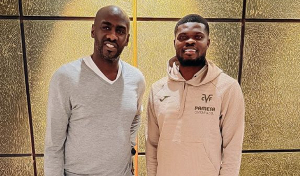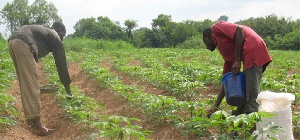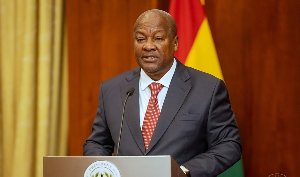Erik Solheim, 52, Norway's minister of international development has written to the Ghanaian government expressing an intention to visit Ghana, according to sources.
This follows a meeting at Oslo, with two Ghanaian journalists, Kweku Baako and Asare Otchere-Darko, where the two urged his government to focus attention on Ghana, following the Scancem bribery scandal and related matters with development.
Norway, is the world's most generous donor, yet Ghana is not on its list of beneficiaries. The two journalists prodded its development minister to appreciate the link in his country’s aid programme, its policy of making anti-corruption a vital part of its aid package and the negative effects that Scancem’s domineering influence on Ghana’s cement supply, allegedly attained through bribery of government officials, is having on Ghana’s development efforts.
"Thank you and my government will hold discussions with your government to see how we can be of help,” Mr Solheim assured the two reporters who visited his Oslo office on August 8, after finding out from them how they thought his government could help.
Mr Solheim had described as “sad” news that a Norwegian multinational company, Scancem, owners of local cement-producer Ghacem, had been heavily involved in bribing top Ghana government officials.
The journalists told him about Ghana’s recent oil find in commercial quantities, and with Norway being one of the world’s biggest oil producing countries, where the people actually benefit from their oil, Norway could help Ghana in not making the oil find a curse but rather a blessing.
Mr Solheim pointed the two Ghanaian editors to his country’s Oil for Development initiative which aims at assisting developing countries with petroleum resources (or potential) in their efforts to manage these resources in a way that generates economic growth and promotes the welfare of the population in general, and in a way that is environmentally sustainable.
The Norwegian Agency for Development Cooperation is a directorate under Mr Solheim, which runs this programme.
"The intention behind the Government’s 'Oil for Development’ scheme," according to Mr Solheim, "is to enable petroleum-producing countries to utilise revenue from their oil and gas resources to reduce poverty and improve the living conditions of their populations.
"Norway’s petroleum expertise, the internationalisation of its oil industry and its existing engagement in resource management, development, peace and human rights, mean that we are in a good position to play such a role. We must do what we can to ensure that each drop of oil leads to increased welfare."
Norway’s Official Development Assistance for 2004 was about $2.6 billion, constituting 0.94% of gross national income, compared to 0.92% in 2002. This compares with the average country effort in other OECD countries of 0.41%.
Oil revenues continue to give Norway a budget surplus, which is invested in the National Petroleum Fund. In terms of GNI per capita, Norway is one of the richest countries in the world. According to a presentation made to the two journalists by Arntzen de Besche, voted Europe’s number one law firm on the oil industry in 2006, about 93% of revenue from the country’s oil goes to the state.
In 1999, Norway raised the issue of corruption as a serious constraint to development. The then Minister for International Development challenged NORAD to become an international frontline organisation in efforts to combat corruption. The main goal of the action plan was to prevent and curb corruption within a context of good governance.
Also in that earlier interview at the Norwegian Foreign Affairs Office, Mr Solheim said, "I’m saddened to hear what a Norwegian company did in the past in Ghana." He said he had followed the court case of the multi-million dollar bribery scandal as published in Dagens Naeringlsiv Magasinet of 21/22 April 2007, detailing corrupt practices specifically between 1993 and 1998 as stated in a Norwegian court by two of Norway’s most respected journalists, Geir Imset and Harald Vanvik.
The Norwegian journalists reported evidence presented before a Norwegian court that top people under the National Democratic Congress government received bribes of more than $4 million from Scancem with the purpose of consolidating the then Norwegian-owned firm’s hold in the local cement industry.
The Norwegian publication on the Scancem trial had boldly cited former President Rawlings and his wife and former top presidential staffer P V Obeng as allegedly being among recipients of bribe monies from Scancem during the five-year period.
The Ghanaian journalists pushed the Norwegian minister to explain the seeming contradiction between his country’s international political image as a champion of ethical politics and its historical inaction against the corrupt practices of its multinational companies.
While saying he was not by any means justifying bribery, Mr Solheim said "In the past, the excuse was that everyone else was doing it." But, since 2003, under prime minister Jens Stoltenberg’s administration, "the policy of the Norwegian government has completely changed."
He further stated that, until four years ago, Norway, a country that makes good governance and anti-corruption a major action plan in its development aid programme, allowed its companies to effectively claim tax exemptions for bribery monies paid to corrupt officials.
But, the Ghanaian reporters, who expressed indignation at the hitherto silence of the Norwegian authorities on the Scancem scandal accused the Norwegian government of double standards.
Earlier at an Oslo business sector conference on development cooperation, in February 2006, Mr Solheim had described as "positive and important" the "engagement of Norwegian companies in developing countries."
He also told Norwegian multinationals that "We expect Norwegian operations to be ethical and hope that the examples you are setting will be followed by others."
But, the Ghanaian journalists told him it was difficult to see the continuing stranglehold that Ghacem has on Ghana’s cement industry as positive to the locals. They said, though, the bribery might have taken place in the past, the consequences from that practice remained real and devastating, as shown in the recent near-doubling of cement prices in Ghana.
In a statement to the Storting, Norway’s parliament in May last year, Solheim said, "Norway is in a good position to make a contribution. We have just been declared the world’s most successful state by Foreign Policy Magazine.
"Our economy is in good shape, oil revenue is pouring into our coffers, and most Norwegians agree that the nation’s wealth should be shared both within Norway and outside our borders. Norway has strong NGOs, an active labour movement and many religious communities, all of which are important partners in our international development policy."
Sounding critical of Scancem’s activities in Ghana since 1992, when Government began selling its 75% stake in it to the Norwegians, the journalists who could not see any ethical examples worth emulating from that Norwegian company, demanded from the country’s minister of international development what his government intends doing about the social impact of the imbalances that Ghacem’s unfair industrial practices have had on Ghana.
His intended visit to Ghana could be his country’s answer to the Ghacem issue. This week, shocked by the expulsion of six diplomats, Norway has reacted by cutting aid to Ethiopia. Mr Solheim, told the Norwegian daily Aftenposten that "important aid projects in Ethiopia may be reduced, after six diplomats at the Norwegian embassy in Addis Ababa have been asked to leave."
According to Norwegian Foreign Ministry sources, Ethiopia will lose around 30 million Norwegian kroner ($5.3m) in Norwegian development aid.
General News of Tuesday, 4 September 2007
Source: Statesman












